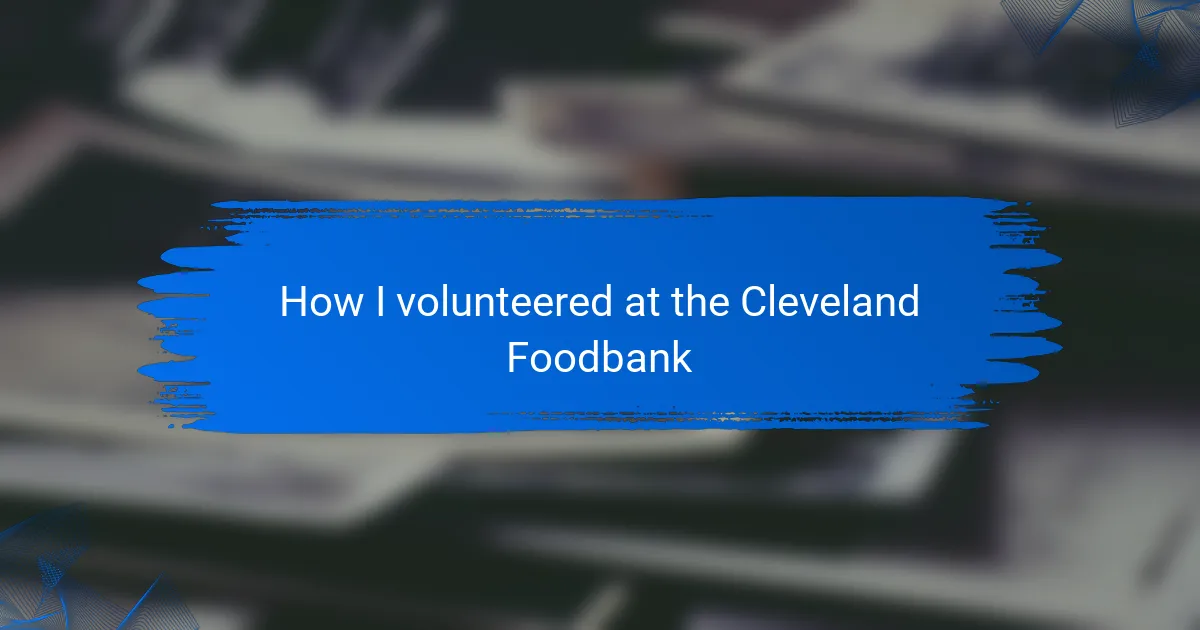Key takeaways
- Volunteering at food banks offers a sense of community and hope, transforming simple tasks into meaningful acts of kindness.
- Cleveland families foster resilience and support each other, creating a strong safety net within the community.
- Preparation and self-care are essential for a rewarding volunteering experience, ensuring volunteers stay focused and energized.
- Involving family in volunteering enhances empathy and strengthens family bonds, turning shared experiences into lasting memories.
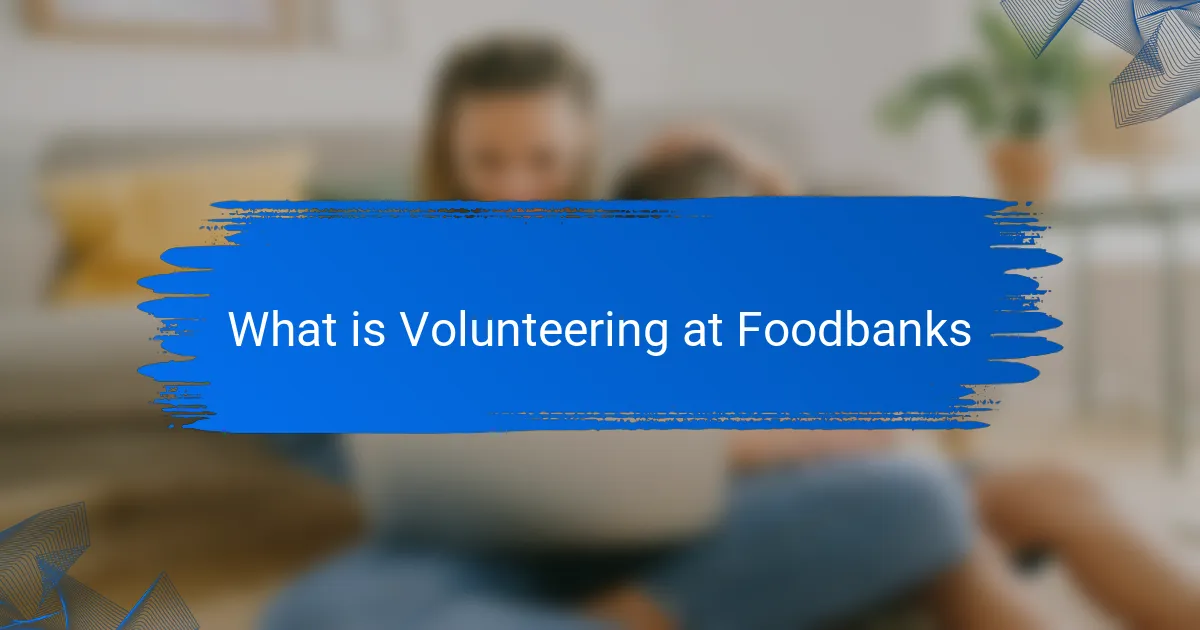
What is Volunteering at Foodbanks
Volunteering at a food bank means stepping into a space where every action directly helps someone in need. I found myself sorting donations, packing boxes, and handing out groceries—simple tasks, but each one felt like a small act of kindness that made a tangible difference. Have you ever wondered how your time could impact a family struggling to put food on their table?
What struck me most was the sense of urgency and care behind every volunteer’s work. It’s not just about distributing food; it’s about offering hope and dignity to people facing difficult times. The experience taught me that volunteering at a food bank isn’t just charity—it’s community in action.
Sometimes, the work can be physically demanding or emotionally heavy, but that’s part of what makes it meaningful. Knowing that a few hours of my day could ease someone’s burden gave me a deep sense of fulfillment. Have you ever felt that kind of connection from lending a hand? Volunteering at food banks invites you into that powerful experience.

Overview of Cleveland Family Lifestyle
Cleveland’s family lifestyle is deeply rooted in community and resilience. I’ve noticed that many families here balance busy schedules while finding time to connect—whether through neighborhood gatherings or weekend outings in local parks. Don’t you think that feeling connected to both your family and community makes daily life a little richer?
One thing that stands out to me is how Cleveland families embrace a mix of traditions and modern living. From farmers markets to local festivals, there’s a real sense of togetherness. When I spend time with families at events, I see how these moments become the stories they’ll share for years.
What really strikes me is how families in Cleveland support each other in both good times and challenges. It’s common to hear about neighbors helping neighbors, which creates an underlying safety net. Have you ever noticed how that kind of support shapes your own sense of belonging and purpose? I believe it’s a key part of what makes The Cle a special place to call home.
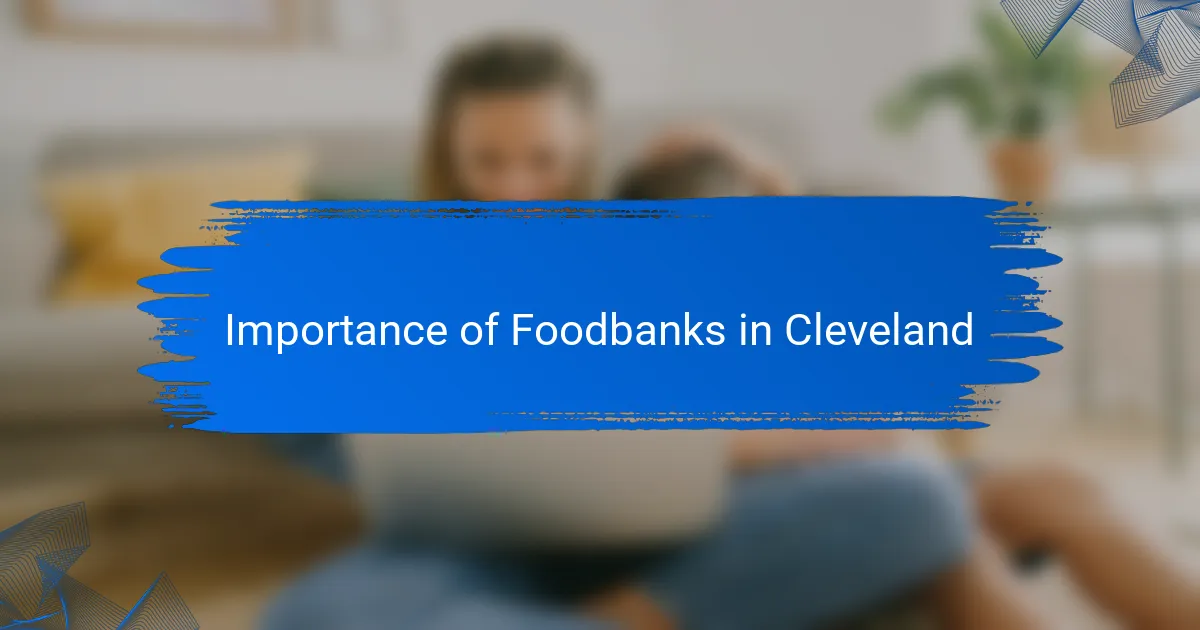
Importance of Foodbanks in Cleveland
Foodbanks in Cleveland play a vital role in bridging the gap for families facing food insecurity. From my experience, these centers are more than just distribution points—they’re lifelines for neighbors who might be going through tough times. Have you ever thought about how many people in your own community rely on such places to keep their families nourished?
I remember being surprised by the sheer volume of food that foodbanks manage each week to serve thousands of people across the city. It made me realize how essential they are in stabilizing families, especially during economic downturns or unexpected hardships. Isn’t it comforting to know that a system exists to catch those who might otherwise slip through the cracks?
Beyond meeting basic needs, foodbanks in Cleveland foster a sense of solidarity and compassion. When you volunteer or visit, you quickly see how these organizations bring together people from all walks of life in a shared mission. Don’t you think that kind of community connection can help heal some of the invisible wounds caused by poverty?
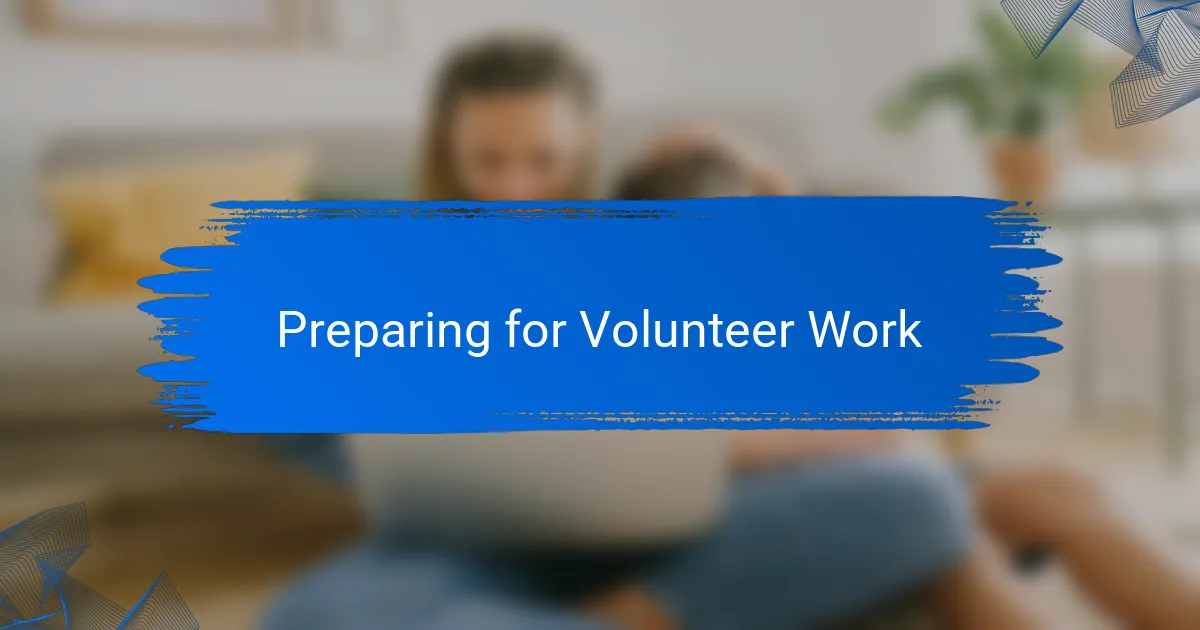
Preparing for Volunteer Work
Before I headed to the Cleveland Foodbank, I made sure to wear comfortable clothes and closed-toe shoes because I knew I’d be on my feet a lot. Have you ever underestimated how physically active volunteering can be? That simple preparation helped me stay focused and energized throughout the shift.
I also took a moment to review any guidelines the foodbank provided, like hygiene protocols and volunteer roles. Knowing what to expect eased my nerves and helped me jump right into the tasks without feeling overwhelmed. Have you noticed how a little planning can turn anxiety into confidence?
One thing I found especially helpful was bringing a water bottle and a small snack, just in case. Volunteering is rewarding, but it can also be demanding, and staying hydrated and fueled makes a big difference. When was the last time you cared for yourself while caring for others? It’s a lesson I won’t forget.
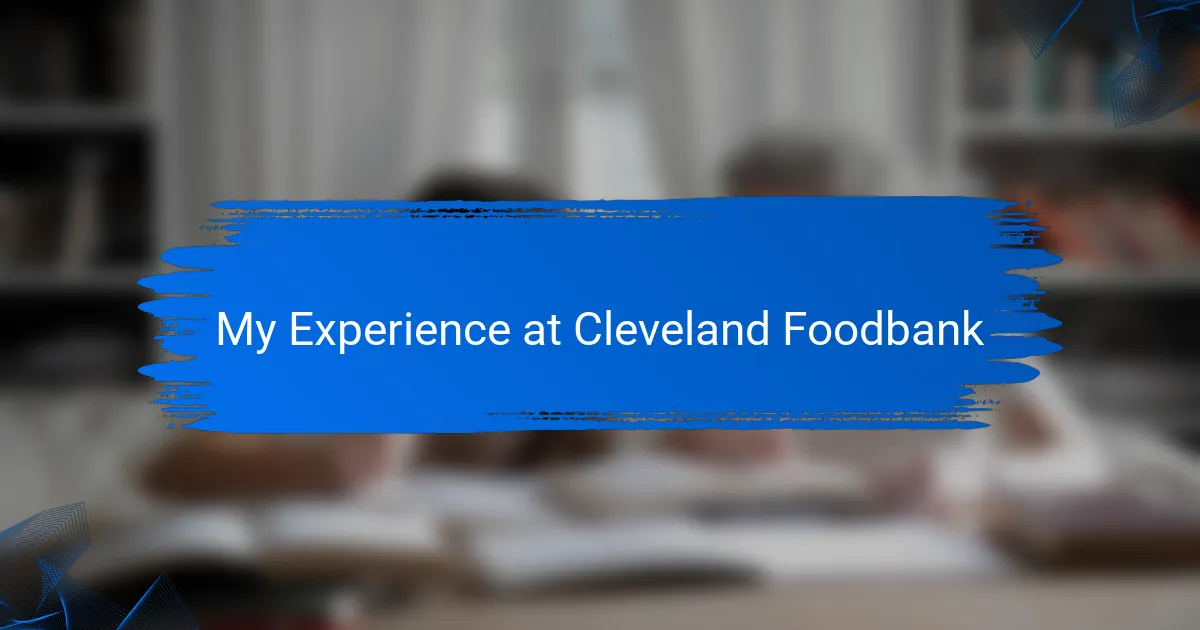
My Experience at Cleveland Foodbank
When I first stepped into the Cleveland Foodbank, the energy was both humbling and inspiring. I remember feeling a mix of eagerness and nervousness as I started sorting donated items, wondering if my small actions could really make a difference. Have you ever had a moment where a simple task suddenly felt so meaningful?
One memory that sticks with me is meeting a fellow volunteer who shared their story of how volunteering helped them heal after a tough period. It made me realize that the experience isn’t just about giving food—it’s about sharing kindness and building resilience together. Doesn’t that make you think about how volunteering can change us as much as those we help?
By the end of my shift, I was physically tired but emotionally uplifted. The smiles from families receiving packages reminded me why community support matters so much. Have you ever walked away from something feeling quietly proud and grateful? That’s exactly how I felt after volunteering at the foodbank.

Tips for Volunteering with Family
One tip I found crucial when volunteering with family is to match tasks to everyone’s ages and abilities. When I volunteered with my kids, we made sure the little ones had simpler jobs like sorting canned goods, which kept them engaged without overwhelming them. Have you ever seen how proud a child feels when they can contribute in a way that suits them? It’s a small moment that turns into lasting encouragement.
Timing is another key point. I learned that choosing a volunteer shift when everyone is well-rested and not rushed makes the experience more enjoyable for all. We picked a weekend morning because my family was fresh and energized, instead of squeezing it in after a busy workday. Doesn’t it make sense that when you’re relaxed, volunteering feels less like a chore and more like quality time together?
Finally, I recommend talking about the experience afterward as a family. Sharing what each person noticed or felt creates a deeper understanding and connection to the cause. After our shift, my family and I sat down and talked about the people we helped and what volunteering meant to each of us. Have you tried reflecting like this? It turned a few hours of work into a meaningful family story we still talk about today.
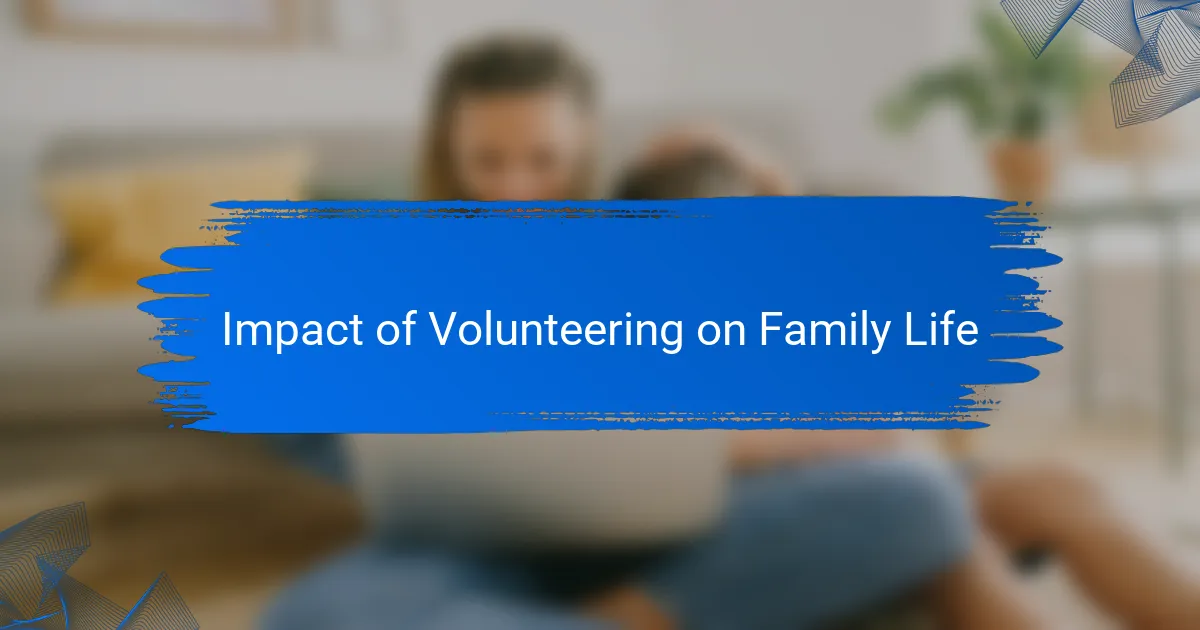
Impact of Volunteering on Family Life
Volunteering at the Cleveland Foodbank had a surprising ripple effect on my family’s dynamics. I noticed that as we worked side by side, the usual distractions faded, and we connected in a meaningful way. Isn’t it amazing how shared purpose can bring people closer, even in the busiest of family lives?
There’s something profound about involving your family in helping others—it teaches empathy beyond words. When my children saw the gratitude in those we served, I felt they understood kindness on a deeper level than any lesson I could give at home. Have you experienced how such moments can shape your family’s values for years to come?
What struck me most was how volunteering became a new thread in our family story, weaving in lessons of resilience and teamwork. It’s not always easy balancing schedules, but making time to serve together created memories that truly felt worthwhile. Don’t you think those shared experiences are what strengthen a family’s foundation over time?
